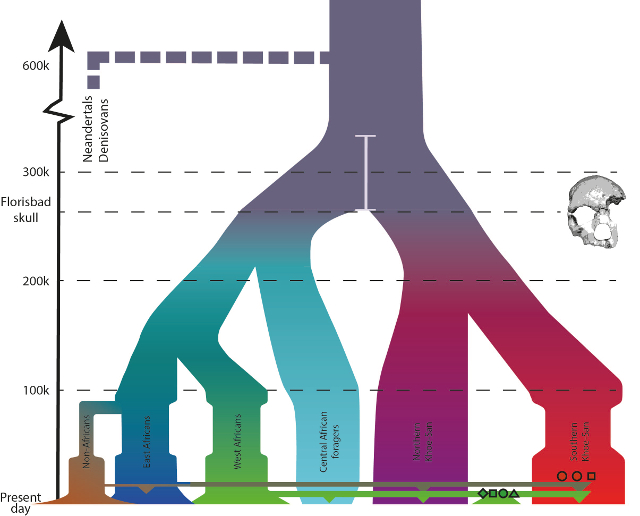 ISTOCK, MICROGENA comparison of the genomes of Stone Age hunter-gatherer bones found in South Africa with those of other populations suggests Homo sapiens arose much earlier than the commonly accepted estimate of 200,000 years ago, researchers reported yesterday (September 28) in Science.
ISTOCK, MICROGENA comparison of the genomes of Stone Age hunter-gatherer bones found in South Africa with those of other populations suggests Homo sapiens arose much earlier than the commonly accepted estimate of 200,000 years ago, researchers reported yesterday (September 28) in Science.
The team analyzed DNA of seven skeletons from the KwaZulu-Natal province of South Africa. Three were hunter-gatherers who lived during the Stone Age, about 2,000 years ago, and four were Iron Age farmers who lived between 300 and 500 years ago. The researchers compared their genomes with those of other ancient and modern people to reconstruct when different groups split off from one another. Their reasoning was that the splits must have occurred after the human species arose, Mattias Jakobsson of Uppsala University in Sweden tells the Associated Press. Based on those estimates, his group reports that Homo sapiens likely diverged from another related species...
See “Scientists Uncover Oldest Homo Sapiens Fossils to Date”
“The reconstruction of deep human history in Africa is becoming increasingly robust when the dating of fossils, such as those from Morocco, the Stone Age archaeological record and human DNA come together to highlight interesting periods in our evolutionary past,” another of the study’s authors, Marlize Lombard of the University of Johannesburg, tells Reuters.
 Demographic model of African history and estimated divergences. Vertical colored lines represent migration, with down-pointing triangles representing admixture into another group. Southern African hunter-gatherers are shown by red symbols and Iron Age farmers in green symbols. C. SCHLEBUSCH ET AL. SCIENCE (2017)Todd Disotell, an anthropologist at New York University, tells the Associated Press he’s sceptical of assumptions used in the study’s calculations, and thinks the evidence is still compelling that the split between species that produced Homo sapiens occurred closer to 200,000 years ago.
Demographic model of African history and estimated divergences. Vertical colored lines represent migration, with down-pointing triangles representing admixture into another group. Southern African hunter-gatherers are shown by red symbols and Iron Age farmers in green symbols. C. SCHLEBUSCH ET AL. SCIENCE (2017)Todd Disotell, an anthropologist at New York University, tells the Associated Press he’s sceptical of assumptions used in the study’s calculations, and thinks the evidence is still compelling that the split between species that produced Homo sapiens occurred closer to 200,000 years ago.
Interested in reading more?





